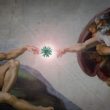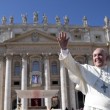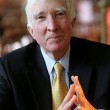Hell and God’s Goodness
by Dr. Dennis Bonnette
Filed under Hell

Although this article will address the content of certain theological doctrines, it is written from a purely philosophical perspective. This is the same method used consistently in my book, Origin of the Human Species, in which I examine how evolutionary theory comports with divine revelation and philosophy. What characterizes philosophical analysis of theological doctrine is that reason alone is the method employed. Thus, while the philosopher as such cannot say whether the Trinity... Read More
Theism vs. Skepticism: The COVID-19 Pandemic
by Dr. Dennis Bonnette
Filed under Uncategorized

In an earlier Strange Notions essay, I addressed the problem of how an all-good God could be compatible with the existence of Hell. While that analysis befits the extreme case, the purpose of the present piece is to address the exact role of responsibility God has in terms of the very real and human tragedy posed by the Covid-19 virus which is presently raging throughout the world. This piece will not address the most ethical or medically correct methods with which to address this pandemic.... Read More
Is the Catholic Church a Force for Good?
by Matt Nelson
Filed under History, The Church

Western civilization is greatly indebted to the Catholic Church. Modern historical studies—such as Dr. Thomas E. Woods' How The Catholic Church Built Western Civilization—have demonstrated with force and clarity that it is the Catholic Church who has been the primary driving force behind the development and progress of the civilized world. The Church has provided innumerable 'goods' for the benefit of humanity. Nonetheless, modern critics assert that no amount of good could outweigh... Read More
In Defense of Classical Theism
by Steven Dillon
Filed under The Existence of God

When I first began to study the philosophy of religion, I became acquainted with a certain style of reasoning about God. This style seems to model arguments for and against God after arguments in the natural sciences, and is very much in vogue today. Herman Philipse is representative when he says that "the methodological dilemma for natural theologians in contemporary Western culture is that they either have to opt for methods of factual research that are intellectually respectable in... Read More
Seven Proofs for the Natural Immortality of the Human Soul
by Tim Staples
Filed under Anthropology

The late Dr. Antony Flew—perhaps the greatest atheist thinker of the last hundred years—came to faith in God largely through his studies in philosophy and, most especially, science, as he recounted in his book written with Roy Abraham Varghese, There is a God: How the World's Most Notorious Atheist Changed His Mind. It was in 2004 that Dr. Flew rocked the world with his confession that he had come to believe in God. He made clear that he accepted deism, and not the God... Read More
No One Sees God
by Matthew Becklo
Filed under The Existence of God

Your brightness is my darkness. I know nothing of You and, by myself, I cannot even imagine how to go about knowing You. If I imagine You, I am mistaken. If I understand You, I am deluded. If I am conscious and certain I know You, I am crazy. The darkness is enough. - Thomas Merton If God exists, why doesn't he make it more obvious? Why doesn't he stop more evil, answer more prayers, or perform a steady stream of miracles - or better yet, all of the above? Why all the darkness and silence,... Read More
Why Does the World Exist?
by Matthew Becklo
Filed under Cosmology

The true mystery of the world is the visible, not the invisible. — Oscar Wilde Recently, I was driving with two of my brothers from New England to New York, and we all got to talking about religion. One gladly played up his own skepticism: isn't it suspicious, he said, that every faith claims to be the "one true church"? Wasn't this mentality ("OTC" we call it now) the stuff of gangs, clubs, and nation states, the same myopic "us vs. them" mentality one sees everywhere in the world,... Read More






